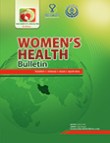Correlation Between Maternal Body Mass Index, Non-stress Test Parameters and Pregnancy Outcomes in Nulliparous Women
Author(s):
Abstract:
Background
An increase in maternal body mass index (BMI) before pregnancy can cause overweight during pregnancy, and negatively affect both the mother and the fetus. Non-stress test (NST) is the most common way to evaluate the fetus during pregnancy..Objectives
This study aimed to evaluate the correlation between maternal BMI and NST parameters as well as the pregnancy outcomes in nulliparous women..Materials And Methods
This case-control study, comprised 67 nulliparous women with the gestational age of 24-28 weeks, selected by simple random sampling, who were admitted to Shooshtari and Hafez hospitals from 2011 to 2012. The case group included 35 pregnant women with BMI greater than 26. The control group consisted of 32 pregnant women with BMI lower than 26. NST was applied to groups and evaluated reactive and non-reactive parameters, basal fetal heart rate, and number of accelerations. Chi-square test was used to examine the reactive and non-reactive parameters and type of delivery. Other variables were statistically analyzed using 1-way analysis of variance (ANOVA)..Results
Our results indicated that the frequency of NST reactive and non-reactive parameters was 41%, 59% in the case group, respectively and 55%, 45% in the control group, respectively. Besides, a significant difference was found between the case and the control group regarding reactive parameters (P = 0.02). However, no significant difference was observed between the two groups concerning the mean of basal fetal heart rate (P = 0.3). However, the number of accelerations in the case group was significantly lower than that of the control group (P = 0.001). Significant increases were found in the case group regarding the mean of post-delivery weight (P = 0.02), BMI after delivery (P = 0.005), neonatal birth weight (P = 0.001), gestational age (P = 0.001), and caesarian section (CS) delivery (P = 0.01)..Conclusions
This study revealed that the increase in maternal BMI was accompanied by a decrease in non-reactive parameters of NST and the number of accelerations of the fetal heart rate which is the most important index for fetal health. Also, a significant increase was observed regarding maternal BMI one month after delivery, neonatal birth weight, gestational age, and CS delivery..Keywords:
BMI , Fetal Heart Accelerations , FHR , Non , Stress Test
Language:
English
Published:
Women’s Health Bulletin, Volume:1 Issue: 3, Oct 2014
Page:
7
magiran.com/p1324896
دانلود و مطالعه متن این مقاله با یکی از روشهای زیر امکان پذیر است:
اشتراک شخصی
با عضویت و پرداخت آنلاین حق اشتراک یکساله به مبلغ 1,390,000ريال میتوانید 70 عنوان مطلب دانلود کنید!
اشتراک سازمانی
به کتابخانه دانشگاه یا محل کار خود پیشنهاد کنید تا اشتراک سازمانی این پایگاه را برای دسترسی نامحدود همه کاربران به متن مطالب تهیه نمایند!
توجه!
- حق عضویت دریافتی صرف حمایت از نشریات عضو و نگهداری، تکمیل و توسعه مگیران میشود.
- پرداخت حق اشتراک و دانلود مقالات اجازه بازنشر آن در سایر رسانههای چاپی و دیجیتال را به کاربر نمیدهد.
In order to view content subscription is required
Personal subscription
Subscribe magiran.com for 70 € euros via PayPal and download 70 articles during a year.
Organization subscription
Please contact us to subscribe your university or library for unlimited access!



